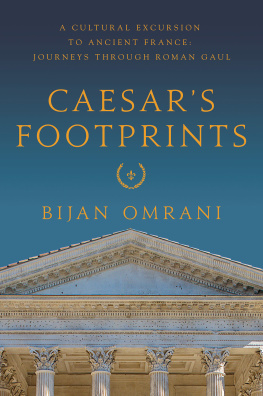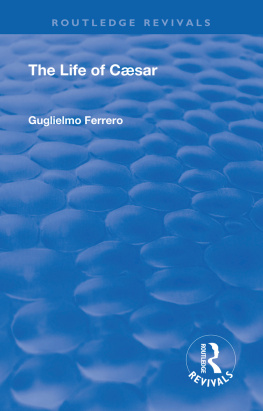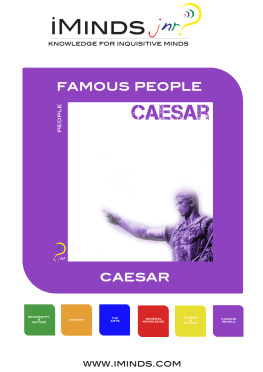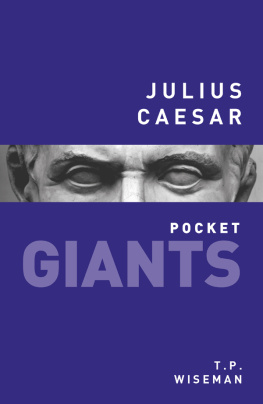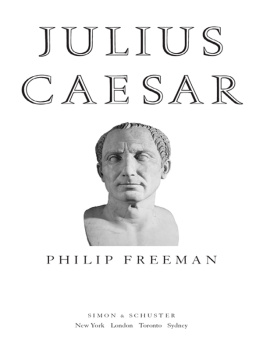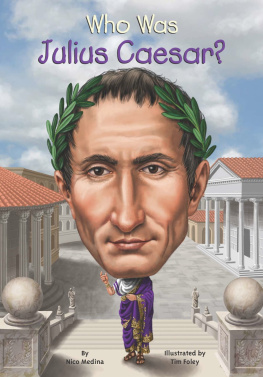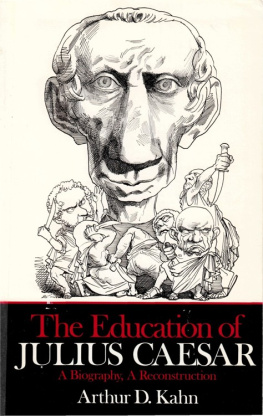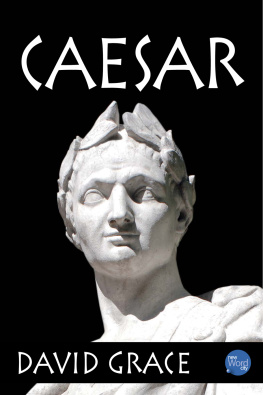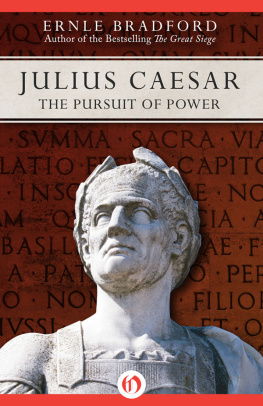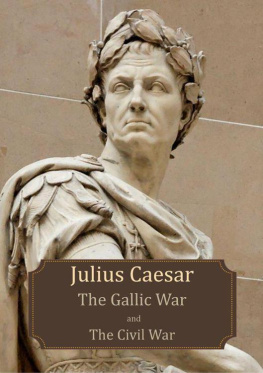CAESAR
LIFE OF A COLOSSUS
First published in the United States in 2006 by Yale University Press.
First published in Great Britain in 2006 by Weidenfeld & Nicolson.
Copyright 2006 by Adrian Goldsworthy.
All rights reserved.
This book may not be reproduced, in whole or in part, including illustrations, in any form (beyond that copying permitted by Sections 107 and 108 of the U.S. Copyright Law and except by reviewers for the public press), without written permission from the publishers.
Text design: www.carrstudio.co.uk.
Printed in the United States of America.
Library of Congress Control Number: 2006922060
ISBN-13: 978-0-300-12048-6 (cloth : alk. paper)
ISBN-10: 0-300-12048-6 (cloth : alk. paper)
A catalogue record for this book is available from the British Library.
The paper in this book meets the guidelines for permanence and durability of the Committee on Production Guidelines for Book Longevity of the Council on Library Resources.
10 9 8 7 6 5 4 3 2 1
ACKNOWLEDGEMENTS
A number of people read through some or part of this book and I should begin by expressing my deep gratitude to them all. Thanks must go to my former undergraduate tutor, Nicholas Purcell, who very kindly agreed to have a look at a draft of the manuscript. Many useful comments came from Philip Matyszak, who knows more than I ever shall about the workings of the Roman Senate in this period. As ever, Ian Hughes was extremely thorough and helpful in checking and commenting on each chapter as it was written. Kevin Powell read the entire thing through and provided a number of useful comments. Ian Haynes was kind enough to look at for me and raised several points. To these, and anyone else who read some or all of the text, I offer my most sincere thanks. Thanks should also go to my agent, Georgina Capel, who negotiated a contract which gave me the opportunity to do this subject justice. Finally, I must thank Keith Lowe and the other staff at Orion for their work on, and enthusiasm for, this project.
MAP LIST
INTRODUCTION
The story of Julius Caesar is an intensely dramatic one, which has fascinated generation after generation, attracting the attention of Shakespeare and Shaw, not to mention numerous novelists and screenwriters. Caesar was one of the ablest generals of any era, who left accounts of his own campaigns that have rarelyperhaps neverbeen surpassed in literary quality. At the same time he was a politician and statesman who eventually took supreme power in the Roman Republic and made himself a monarch in every practical respect, although he never took the name of king. Caesar was not a cruel ruler and paraded his clemency to his defeated enemies, but in the end he was stabbed to death as a result of a conspiracy led by two pardoned men, which also included many of his own supporters. Later his adopted son Octavianfully Caius Julius Caesar Octavianusbecame Romes first emperor. The family line perished with Nero in AD 68, but all later emperors still took the name of Caesar, even though there was no link by blood or adoption. What had simply been the name of one aristocratic familyand a fairly obscure one at thatbecame effectively a title symbolising supreme and legitimate power. So strong was the association that when the twentieth century opened, two of the worlds great powers were still led by a kaiser and a tsar, each name a rendering of Caesar. Today the Classics have lost their central position in Western education, but even so Julius Caesar remains one of a handful of figures from the ancient world whose name commands instant recognition. Plenty of people with no knowledge of Latin will recall Shakespeares version of his dying words, et tu Brute (in fact, he probably said something else (see p.5089) but that is by the way). Of other Romans only Nero, and perhaps Mark Antony, enjoy similar fame, and from other nations probably only Alexander the Great, the Greek philosophers, Hannibal and, most of all, Cleopatra remain so high in the public consciousness. Cleopatra was Caesars lover and Antony one of his senior lieutenants, and so both form part of his story.
Caesar was a great man. Napoleon is just one of many famous commanders who admitted that he had learned much from studying Caesars campaigns. Politically he had a huge impact on Roman history, playing a key role in ending the Republican system of government, which had endured for four and a half centuries. Although he was fiercely intelligent and highly educated, Caesar was a man of action and it is for this that he is remembered. His talents were varied and exceptional, from his skill as an orator and writer, as framer of laws and as political operator, to his talent as soldier and general. Most of all there was his charm that so often won over the crowd in Rome, the legionaries on campaign and the many women whom he seduced. Caesar made plenty of mistakes, both as commander and as politician, but then which human being has not? His great knack was to recover from setbacks, admit, at least to himself, that he had been wrong, and then adapt to the new situation and somehow win in the long run.
Few would dispute Caesars claim to greatness, but it is much harder to say that he was a good man, or that the consequences of his career were unambiguously good. He was not a Hitler or a Stalin, nor indeed a Genghis Khan. Even so one source claims that over a million enemies were killed during his campaigns. Ancient attitudes differed from those of today, and the Romans had few qualms about Caesars wars against foreign opponents like the tribes of Gaul. In eight years of campaigning at the very least Caesars legions killed hundreds of thousands of people in the region, and enslaved as many more. At times he was utterly ruthless, ordering massacres and executions, and on one occasion the mass mutilation of prisoners whose hands were cut off before they were set free. More often he was merciful to defeated enemies, for the essentially practical reason that he wanted them to accept Roman rule and so become the peaceful taxpaying population of a new province. His attitude was coldly pragmatic, deciding on clemency or atrocity according to which seemed to offer him the greatest advantage. He was an active and energetic imperialist, but having said that he was not the creator of Roman imperialism, merely one of its many agents. His campaigns were not noticeably more brutal than other Roman wars. Far more controversial at the time were his activities in Rome and his willingness to fight a civil war when he felt that his political rivals were determined to end his career. His grievances had more than a little justice, but even so when Caesar took his army from his province into Italy in January 49 BC he became a rebel. The civil wars that followed his assassination finally brought the Roman Republic to an end. Its condition may already have been terminal because of Caesars own actions. The Republic fell and was replaced by the rule of emperors, the first of whom was his heir. During his dictatorship Caesar held supreme power and had generally governed well, bringing in measures that were sensible and statesmanlike and for the good of Rome. Previously the Republic had been dominated by a narrow senatorial elite, whose members all too often abused their position to enrich themselves by exploiting poorer Romans and the inhabitants of the provinces alike. Caesar took action to deal with problems that had been acknowledged as real and serious for some time, but which had not been resolved because of a reluctance to let any individual senator gain the credit for the act. The Republican system was pretty rotten and had been troubled by violence from before Caesars birth, and civil war from early in his life. He won supreme power by military force, and we know that he employed bribery and intimidation at other stages in his career. His opponents were no different in their methods and were as willing to fight a civil war to destroy Caesars position as he was to defend it, but that is only to say that he was no better or worse than they were. After his victory he ruled in a very responsible manner and in marked contrast to the senatorial aristocracyhis measures were designed to benefit a much broader section of society. His regime was not repressive and he pardoned and promoted many former enemies. Rome, Italy and the provinces were all better off under Caesar than they had been for some time. Yet if he governed responsibly, his rule also effectively meant the end to free elections, and however just his rule was, in the end monarchy would lead to emperors like Caligula and Nero. It was the wealthy elite at Rome who tended to write the histories and Caesars rise meant a reduction in the power of this class. Therefore, many sources are critical of him for this reason.


